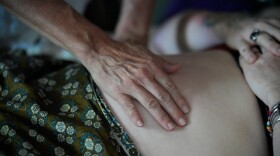-
For pregnant agricultural workers, those risks are higher because the body must work harder to cool down and requires more liquids, making it more easily dehydrated.
-
Across Florida, summer heat has generally been extended by about a week and a half to two weeks. This is based on a Climate Central analysis using data from the National Weather Service between 1970 and 2024.
-
Marco Antonio Hernandez Guevara had just begun his first day on a job in Southwest Florida farm fields when he is believed to have succumbed to heat stroke.
-
Two-thirds of the dangerously hot days in Florida in recent years were linked to climate change. Symptoms of heat exposure include false labor contractions and even pre-term labor.
-
For decades, seniors, children and outdoor workers were some people considered the most vulnerable to heat. A 2017 paper was among the first to add pregnant people to this list.
-
On "The Florida Roundup," Dr. Cheryl Holder gave tips on how to protect yourself during extreme heat. For example, avoiding alcohol and excessive caffeine.
-
Heat killed 199 Americans in 2024. That is more than double the second leading cause of weather-related deaths in the United States, flooding, which killed 89 Americans in 2024. It´s important to know the symptoms.
-
Outdoor workers in Florida are reporting dizziness on the job, headaches and hospitalizations after experiencing heatstroke this summer.
-
With record temperatures hitting the U.S., Alicia Grace, the owner of Pink Flamingo Stables, has to take extra steps to keep her horses safe and healthy in South Florida’s hot and humid climate.
-
Child safety advocates are warning about the dangers of heatstroke from leaving kids in hot cars. Experts say vehicle temperatures can rise 20 degrees in just 10 minutes, even on mild days, putting children at serious risk.
-
Heat deaths continue to rise. Heat-related deaths doubled from 1999 to 2023, with 21,518 deaths recorded during that period. There is a difference between stroke and exhaustion; learn the signs.
-
A federal judge has rejected a request by Florida corrections officials to dismiss a class-action lawsuit alleging that the state has violated inmates' rights due to hot conditions at a prison in Miami-Dade County.
Play Live Radio
Next Up:
0:00
0:00
Available On Air Stations











